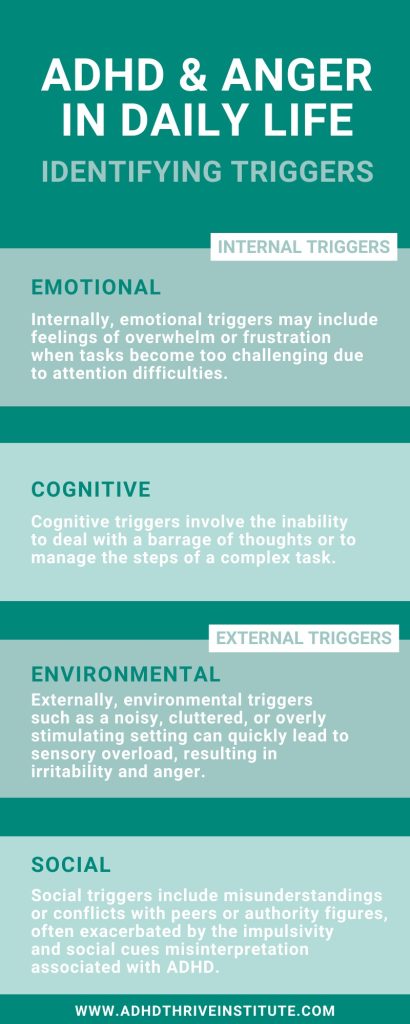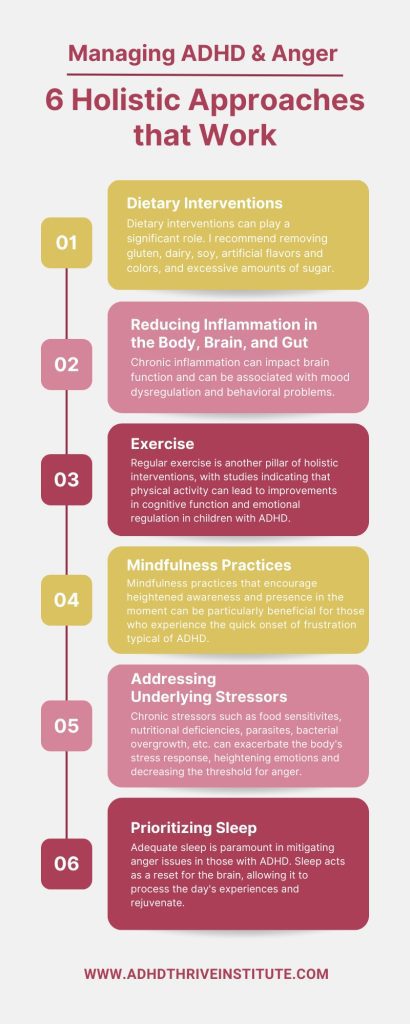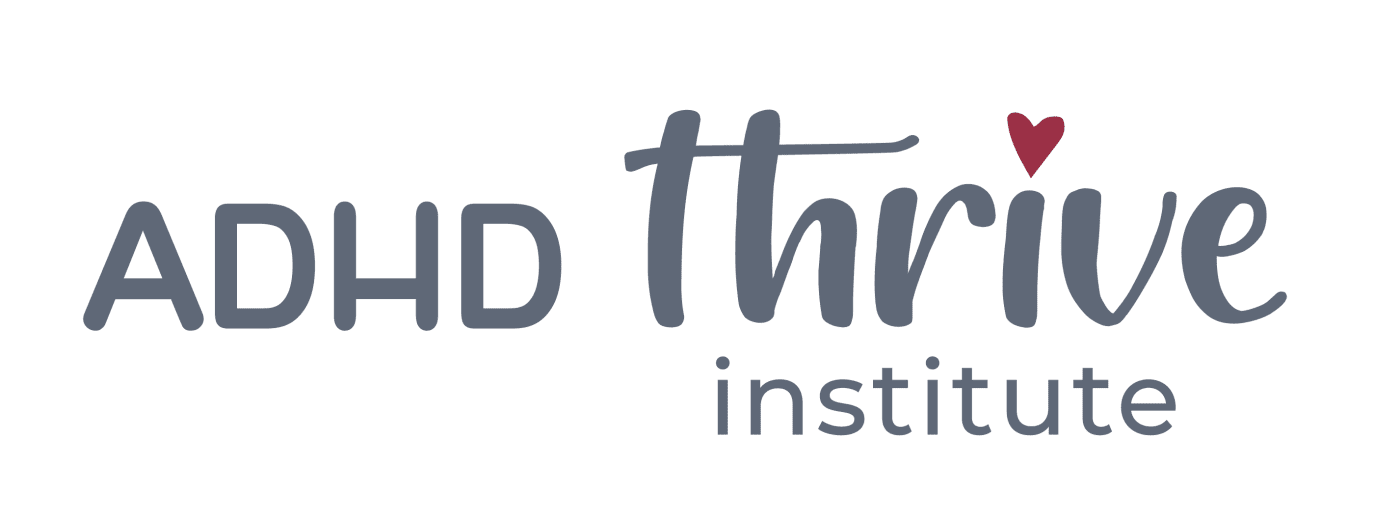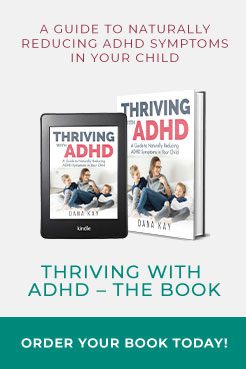Navigating the stormy waters of ADHD can be daunting enough, but when anger issues frequently capsize the boat, it calls for a deeper understanding and a robust guide to steer through the turbulence.
ADHD, a condition often shrouded in misconceptions, can manifest a less talked about but significant challenge: the struggle with anger management.
This comprehensive guide aims to unpack the relationship between ADHD and anger, examining the causes, manifestations, and management strategies.
ADHD and Anger
Attention Deficit Hyperactivity Disorder (ADHD) is a neurodevelopmental condition characterized by symptoms such as persistent inattention, hyperactivity, and impulsivity.
It’s not uncommon for individuals with ADHD, both children and adults, to experience associated anger issues. This can stem from frustration with their symptoms or from the brain’s neurological response to stimuli, which can be more intense due to the disorder.
Anger in individuals with ADHD may present as irritability, quick temper, or even explosive outbursts. These reactions are often due to the individual’s difficulty in managing the executive functions of the brain, a set of cognitive processes that include attentional control, inhibitory control, working memory, and cognitive flexibility. These executive functions are often impaired in ADHD, making it harder for individuals to regulate their emotions effectively.
Research suggests that the emotional dysregulation seen in ADHD is linked to deficits in the brain’s self-management system. Experts like Dr. Russell Barkley, a clinical psychologist who is a leading authority on ADHD, emphasize that these challenges are not a result of willful non-compliance or defiance but rather a part of the symptomatology of ADHD.
Signs that a person with ADHD may be struggling with anger management include frequent mood swings, anger outbursts over minor provocations, and a history of trouble with interpersonal relationships. Such individuals may express remorse or embarrassment after the anger has passed, indicating a lack of control over their emotional response.
Understanding the link between ADHD and anger is crucial for developing effective coping strategies. It also underscores the importance of seeking comprehensive treatment plans that address both the cognitive and emotional needs of those with ADHD.
ADHD and Anger in Daily Life – Identifying Triggers

Common triggers for anger outbursts in individuals with ADHD often stem from both internal and external factors.
Internally, emotional triggers may include feelings of overwhelm or frustration when tasks become too challenging due to attention difficulties.
For example, a student with ADHD may experience an anger outburst during a test when they can’t concentrate because of the ticking clock or the rustling papers around them.
Cognitive triggers involve the inability to deal with a barrage of thoughts or to manage the steps of a complex task.
Externally, environmental triggers such as a noisy, cluttered, or overly stimulating setting can quickly lead to sensory overload, resulting in irritability and anger.
Social triggers include misunderstandings or conflicts with peers or authority figures, often exacerbated by the impulsivity and social cues misinterpretation associated with ADHD.
A case in point could be an individual with ADHD reacting with disproportionate anger during a class project when they feel their ideas are not being acknowledged or heard.
Identifying these triggers is a critical step in developing strategies to manage and reduce anger outbursts effectively.
Frustration and Aggression – How They Impact Your Life
Constant feelings of frustration and aggression can affect many aspects of a person’s life.
Psychologically, these intense emotions can lead to a cycle of negative thinking, strained communications, and conflicts with friends, family, and colleagues.
From a neuroscience perspective, chronic frustration and aggression can alter brain chemistry, leading to a heightened state of stress response and diminishing the brain’s capacity for emotional regulation.
This state of continuous alert can exacerbate ADHD symptoms, creating a feedback loop that further impairs social interactions and cognitive functions. Over time, the wear and tear of this chronic stress can also contribute to a host of physical health problems, like hypertension and a weakened immune system, showing the profound interconnectivity of emotional health and physical health.
In a child with ADHD, anger can have a pervasive impact on not just their own life but also on the family as a whole.
These intense emotions can lead to difficulties in school, from strained relationships with peers and teachers to disruptions in the learning process. The constant battle with these feelings can erode the child’s self-esteem, making them feel isolated or misunderstood or even ashamed of the person they are.
For the family, this aggression can create an atmosphere of tension and walking on eggshells, where daily routines are often disrupted by the need to manage or anticipate outbursts. It can strain the family dynamics, causing stress and conflict between siblings and parents, and even impact the parents’ relationship with each other as they navigate the complexities of supporting their child.
The emotional toll on the family unit can be substantial, necessitating a supportive network and effective strategies to manage these challenges together.
Managing Anger When You Have ADHD – Strategies That Can Help

For individuals with ADHD, managing anger requires tailored strategies that address their unique challenges.
Mindfulness practices are a foundational technique, helping to ground one’s attention in the present moment, which can diffuse the immediacy of anger. For example, simple breathing exercises — focusing on slow, deep breaths — can help regulate emotional responses.
Cognitive-behavioral strategies also offer significant benefits; they involve identifying negative thought patterns that lead to anger and replacing them with more constructive ones. This could mean learning to recognize when you’re jumping to conclusions in social situations and consciously considering alternative interpretations.
Lifestyle adjustments are equally important; regular physical exercise can serve as an outlet for frustration and excess energy, while a consistent sleep schedule can improve overall mood and impulse control.
Implementing a routine that includes these strategies — perhaps starting with a morning meditation to foster calmness and ending with a reflective journaling session at night to process the day’s events — can provide a structured approach to managing anger for those with ADHD.
But what if it’s a child who is experiencing ADHD and anger?
It can be tricky to get a child (who is already noncompliant with many tasks) to practice mindfulness or journaling. Children, especially those with attention difficulties, may resist activities that require them to sit still or focus for extended periods, like mindfulness or journaling.
However, mindfulness can be introduced in playful and engaging ways, such as through “mindful games” that involve listening for a bell or engaging in a “color hunt” to find items of different colors in the room. These activities can capture a child’s attention and teach them to be present in the moment.
For journaling, it can be helpful to start with drawing or using stickers to express emotions, gradually building up to writing as their skills develop.
Incorporating physical activities that require focus, such as martial arts or dance, can provide an outlet for their energy and teach self-discipline in a way that’s naturally appealing to children.
With patience and creativity, parents can find methods to help their children with ADHD and anger issues practice self-reflection and self-regulation.
Managing ADHD and Anger – 6 Holistic Approaches that Work

Holistic approaches for ADHD and associated anger issues encompass a variety of non-pharmaceutical methods that aim to address the individual as a whole.
1. Dietary Interventions:
Dietary interventions, for instance, can play a significant role. I recommend all of the families I work with remove gluten, dairy, soy, artificial flavors and colors, and excessive amounts of sugar from their child’s diets.
That’s because these foods are highly inflammatory, and inflammation in the body, gut, and brain can lead to an exacerbation of ADHD symptoms.
One of the first improvements that many families report after removing these foods is better emotional dysregulation and less anger in their children with ADHD.
2. Reducing Inflammation in the Body, Brain, and Gut:
Inflammation in the body is a contributing factor to a range of mental health issues, including anger and irritability. Chronic inflammation can impact brain function and has been associated with mood dysregulation and behavioral problems.
By reducing inflammation through dietary changes—such as increasing the intake of anti-inflammatory foods like omega-3-rich fish, fruits, vegetables, and gluten free whole grains, while decreasing the consumption of inflammatory foods like gluten, dairy, soy, and others listed above—a calmer and more stable mood may be achieved.
Additionally, lifestyle modifications, such as regular physical activity and stress reduction techniques, have been shown to lower inflammation levels in the body.
These adjustments can potentially alleviate the intensity and frequency of anger outbursts, leading to improved emotional responses and interactions.
3. Exercise:
Regular exercise is another pillar of holistic interventions, with studies indicating that physical activity can lead to improvements in cognitive function and emotional regulation in children with ADHD.
For children with ADHD, engaging in consistent physical activity has been shown to enhance cognitive functions such as attention, working memory, and executive function—skills that are often compromised in ADHD.
The physical exertion involved in exercise leads to the release of endorphins, neurotransmitters that can elevate mood and create a natural calm. Exercise increases the availability of brain-derived neurotrophic factor (BDNF), a protein that supports the growth and differentiation of neurons, aiding brain health.
Structured activities like martial arts or team sports can also teach children self-discipline, patience, and cooperation, which can translate to better emotional regulation and decreased impulsivity.
4. Mindfulness Practices:
Mindfulness and meditation are increasingly recognized for their effectiveness in reducing anger in individuals with ADHD. These practices, which encourage heightened awareness and presence in the moment, can be particularly beneficial for those who experience the quick onset of frustration typical of ADHD.
By fostering a state of mindful awareness, individuals learn to observe their thoughts and feelings without immediate reaction, allowing space for a more considered response.
Such practices also help in recognizing the physical signs of anger early on, providing an opportunity to employ calming techniques before emotions escalate.
5. Addressing Underlying Stressors:
Addressing underlying stressors in the body can play a crucial role in managing anger issues, particularly for those with ADHD.
Chronic stressors such as food sensitivities, nutritional deficiencies, parasites, bacterial overgrowth, etc. can exacerbate the body’s stress response, heightening emotions and decreasing the threshold for anger.
Kryptopyrrole, also known as pyroluria, is a chemical imbalance involving an overproduction of pyrrole molecules, which can have a notable impact on mental health. It’s one of the most common underlying stressors I see in children with ADHD who are also dealing with anger issues.
While not widely tested in conventional medicine, many holistic practitioners have seen significant improvement in symptoms, specifically anger and emotional dysregulation, once this underlying stressor has been addressed.
By identifying these stressors through functional lab testing and mitigating these underlying issues through gentle and targeted supplementation, individuals can significantly improve their physiological resilience and emotional regulation.
6. Prioritizing Sleep:
Adequate sleep is paramount in mitigating anger issues in those with ADHD. Sleep acts as a reset for the brain, allowing it to process the day’s experiences and rejuvenate.
For children with ADHD, who often struggle with emotional regulation, a lack of sleep can significantly lower their threshold for frustration, leading to quicker and more intense anger reactions.
Ensuring a consistent sleep schedule provides these children with the rest they need to better manage their impulses and emotions.
Quality sleep enhances neural connectivity, improves attention, and stabilizes mood, which in turn can decrease the likelihood of anger outbursts.
Parenting Tips for Dealing With ADHD and Anger

For parents navigating the complexities of ADHD and concurrent anger issues in their children, a proactive and structured approach can be invaluable.
Here are some concrete steps and tips to consider:
✔️ Establish Predictable Routines: Children with ADHD benefit from knowing what to expect. Set regular times for meals, homework, and sleep to provide a sense of security and control.
✔️ Create a Calm Environment: Designate a quiet space in your home where your child can go to cool down when feeling overwhelmed or angry.
✔️ Practice Emotional Recognition: Teach your child to identify and express their emotions in a healthy way. Use emotion cards or charts to help them articulate their feelings.
✔️ Encourage Physical Activity: Regular exercise can be an effective outlet for pent-up energy and frustration. Activities such as team sports, martial arts, or simply playing in the park can make a difference.
✔️ Promote Mindfulness and Relaxation: Simple mindfulness exercises and breathing techniques can help children learn to manage their responses to anger-provoking situations.
✔️ Use Positive Reinforcement: Recognize and reward good behavior consistently, which reinforces the desired behavior and boosts self-esteem.
✔️ Develop Coping Strategies: Together with your child, create a list of strategies to use when they feel anger rising, such as counting to ten, deep breathing, or stepping away from the situation.
✔️ Seek Professional Help: A therapist specializing in ADHD can offer personalized strategies for anger management and help develop a tailored plan for your child.
✔️ Educate Yourself: Stay informed about ADHD and anger management through trusted resources, such as books, workshops, and reputable websites.
✔️ Join Support Groups: Connect with other parents through support groups, either locally or online. Take care of yourself because it is HARD to support a child who experiences both ADHD and anger issues.
Getting Professional Help – Knowing When it’s Time to Seek Out Assistance
Recognizing when to seek professional help for managing ADHD and anger is crucial for the well-being of your child.
Here are some signs that indicate it might be time:
✔️ Intensified Symptoms: If episodes of anger are becoming more frequent or intense, it may be beyond what can be managed at home.
✔️ Disruption to Daily Life: When anger begins to significantly disrupt school, family life, or friendships, it might be time to seek outside support.
✔️ Safety Concerns: Any signs of aggression towards others or self-harm are clear indicators that professional help is needed.
✔️ Nonresponse to Home Strategies: If established home management strategies are not yielding improvements, it might be wise to seek support.
✔️ Social Withdrawal: If your child is withdrawing from activities they previously enjoyed or is struggling to maintain friendships due to their symptoms, professional guidance can help.
✔️ Parental Overwhelm: If you as a parent feel overwhelmed and unsure about how to manage your child’s ADHD and anger, seeking help can provide both support and strategies.
Professionals who can assist might include Child Psychologists or Psychiatrists, Licensed Professional Counselors, Pediatric Neuropsychologists, ADHD Coaches, and/or Holistic Health Practitioners to provide more natural support.
Getting Started with ADHD Thrive Institute
While anger can be a common companion to ADHD, with the right strategies and understanding, it can be managed, allowing individuals to lead fulfilling lives.
If you’re navigating these challenges, you don’t need to do it alone.
Our website offers a wealth of resources, from expert advice to community support, designed to guide families toward managing ADHD with natural strategies.
We invite you to tune in to our podcast or, if you haven’t already, watch our free ADHD masterclass and discover how to begin naturally reducing your child’s ADHD symptoms.







